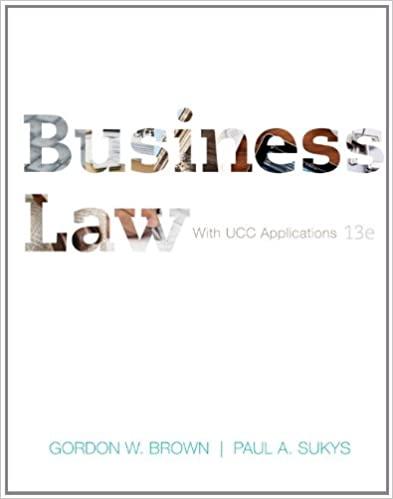Lisa A. Bloch filed for bankruptcy relief, seeking a discharge of her student loan obligations. A 41-year-old
Question:
Lisa A. Bloch filed for bankruptcy relief, seeking a discharge of her student loan obligations. A 41-year-old woman with no dependents, Bloch attended a number of prestigious universities and colleges including Radcliffe, Cornell, Harvard, and Princeton. Her graduate education, a master’s degree in public administration from Suffolk University in Boston, was financed through five promissory notes totaling $41,863, which had been assigned to the defendant, Educational Credit Management Corp. (ECMC).
While in Boston, she established a pattern of sporadic, full-time employment supplemented by part-time clerical assignments arranged by temporary employment agencies. The evidence at trial suggested that Bloch has an impressive educational résumé and an abundance of marketable skills, including considerable computer background and some management experience. After obtaining her master’s degree, she moved to Seattle, Washington, without a job and incurred moving expenses of approximately $5,000. Her employment woes continued in Seattle, where she failed to obtain permanent work. Her testimony revealed that she survived for the last year by living with friends and paying expenses by accepting a gratuitous $4,000 loan. Bloch admitted she had no physical or mental disabilities that would hinder her from working full time, but for some unexplained reason, either a personality issue or perhaps wanderlust, she had not been employed in any one full-time position for longer than a year since attaining her master’s degree.
At the time of the trial, Bloch worked less than 30 hours per week at $20 per hour, earning approximately $2,350 per month gross pay. She testified that she was reluctant to seek additional evening or weekend employment because it would impede her search for a permanent full-time position. She presented evidence showing her current monthly living expenses to be approximately $2,200.
At trial, Bloch expressed optimism about an improvement in her job prospects, a desire to repay her outstanding loans, and an acknowledgment that she only brought this action as a result of her frustration in dealing with the various student loan agencies.
The Court’s Opinion:
A discharge under sections 727, 1141, 1228(a), 1228(b), or 1328 (b) of this title does not discharge an individual debtor from any debt for an educational benefit, overpayment or loan made, insured or guaranteed by a governmental unit, or made under any program funded in whole or in part by a governmental unit or nonprofit institution, or for an obligation to repay funds received as an educational benefit, scholarship or stipend unless excepting such debt from discharge under this paragraph will impose an undue hardship on the debtor and the debtor’s dependents. . . .
(T)he issue . . . is whether the Debtor has met her burden of proving that excepting her student loan obligations from discharge will cause her “undue hardship.”
This Court has adopted the “totality of the circumstances”
test. . . . In Dolan v. American Student Assistance, et al., 256 B.R. 230, this Court stated that a debtor seeking discharge of student loans under § 523(a)
(8) “must prove by a preponderance of the evidence, that
(1) His past, present, and reasonably reliable future financial resources.
(2) His and his dependents’ reasonably necessary living expenses, and;
(3) Other relevant facts or circumstances particular to the debtor’s case are such that excepting the student loans from discharge will prevent the debtor from maintaining a minimal standard of living, even with the advantage of a discharge of his other pre-petition debts.” By making specific findings as to each of these matters, the Court must then determine if excepting a debtor’s student loans from discharge will impose an “undue hardship” on that debtor and the debtor’s dependents. Having stated the applicable analysis for “undue hardship” in this Court, I now turn to this Debtor’s request for relief.......
Question
1. What must a debtor prove to be excepted from the rule that a student loan obligation cannot be discharged in bankruptcy?
2. What is the name of the test that the court has adopted to determine whether an exception exists?
3. What three points must a debtor prove to meet the test?
4. Summarize the court’s opinion on each point.
5. What was the decision of the court?
Step by Step Answer:

Business Law With UCC Applications
ISBN: 9780073524955
13th Edition
Authors: Gordon Brown, Paul Sukys





